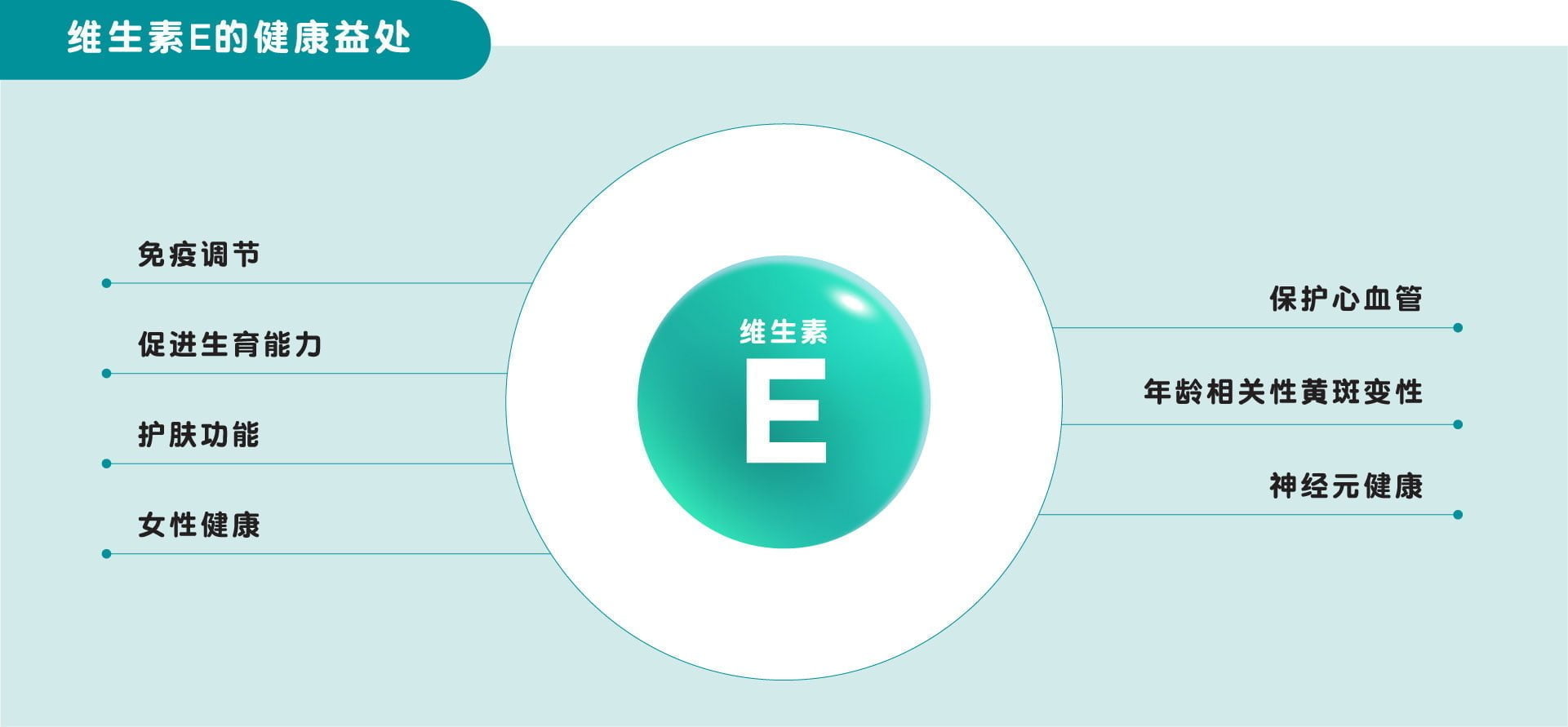维生素 E

维生素 E
维生素E是一种脂溶性维生素,具有独特的抗氧化活性 1。 它存在于这些食物当中,如坚果(榛子、花生)、种子(葵花籽)、大豆油、小麦胚芽油、玉米油和植物油 1。
营养价值
它以八种不同的自然形式存在,如 α-、β-、γ- 和 δ-生育酚以及 α-、β-、γ- 和 δ-生育三烯醇,各自具有不同的生物活性数值 1,2。 人类的肠道可吸收各种形式的维生素E,但在肝脏则是优先分泌出 α-生育酚,且代谢其他形式的维生素E 1。因此,在这些形式当中,α-生育酚是公认的满足人类需求的唯一形式。
健康益处
1. 免疫调节
据报道,补充维生素E可增强体液免疫反应,有助对抗一些传染病 3。维生素E的抗炎和抗氧化特性有助于改善空气污染带给人体的伤害。临床试验也支持服用维生素E和C能改善空气污染所引起的气道炎症 4。
2. 促进生育能力
维生素E可改善妇女的子宫内膜反应,有助维持健康的妊娠 5。它可抑制体内活性氧化物质(ROS)的生产,解决男性不育问题。研究显示补充维生素E与硒或维生素C可提高精子活力及浓度 6。
3. 护肤功能
它减少炎症反应,促进皮肤保湿,还有助于伤口愈合 7。口服维生素E已被证明能改善过敏性皮炎患者的症状(如瘙痒和皮损程度)和生活质量,与维生素C同时服用有助于保护皮肤免受紫外线伤害 8。
4. 年龄相关性黄斑变性
年龄相关性眼病研究(AREDS)发现,补充维生素C、E、β-胡萝卜素、锌和铜的剂量高于推荐的每日摄入量,有助于降低老年性黄斑部病变(AMD)的风险约25% 9。
5. 女性健康
研究发现,维生素E有助于缓解原发性痛经的疼痛,减少更年期妇女的潮热,以及改善经前综合征妇女的身体不适 10,11,12。
6. 保护心血管
观察性研究发现,摄入越高的维生素E可助降低心脏病发病率 13。维生素E可抑制低密度脂蛋白胆固醇的氧化,防止血栓形成,从而预防动脉粥样硬化、心脏病发作或静脉血栓栓塞 14。
7. 神经元健康
维生素E的抗氧化特性可防止神经元受损和改善正常老年认知衰退,因此具有神经保护作用 15。研究表明,摄入更多的维生素E有助于预防阿尔茨海默病,但这还需要进一步的研究来证实维生素E对大脑健康的影响。
建议每日剂量
建议的每日剂量范围为 15 IU 至1000 IU 1,16。市场上大多数维生素E补充剂都含有 400 IU 至 1000 IU。维生素E的上限则被设在 1465 IU(约 1000 毫克),超过此剂量可能会导致过度出血 17。
参考
1. National Health Institutes. 2020. Vitamin E Fact Sheet for Health Professionals. https://ods.od.nih.gov/factsheets/VitaminE-HealthProfessional/
2. Traber, M. G., & Atkinson, J. (2007). Vitamin E, antioxidants and nothing more. Free radical biology & medicine, 43(1), 4–15. https://doi.org/10.1016/j.freeradbiomed.2007.03.024
3. Lee, G. Y., & Han, S. N. (2018). The Role of Vitamin E in Immunity. Nutrients, 10(11), 1614. https://doi.org/10.3390/nu10111614
4. McLoughlin, R. F., Berthon, B. S., Williams, E. J., & Wood, L.G. (2019) Vitamin E and Air Pollution. In: Weber P., Birringer M., Blumberg J., Eggersdorfer M., Frank J. (eds) Vitamin E in Human Health. Nutrition and Health. Humana Press, Cham. https://doi.org/10.1007/978-3-030-05315-4_27
5. Mohd Mutalip, S. S., Ab-Rahim, S., & Rajikin, M. H. (2018). Vitamin E as an Antioxidant in Female Reproductive Health. Antioxidants (Basel, Switzerland), 7(2), 22. https://doi.org/10.3390/antiox7020022
6. Ahmadi, S., Bashiri, R., Ghadiri-Anari, A., & Nadjarzadeh, A. (2016). Antioxidant supplements and semen parameters: An evidence based review. International journal of reproductive biomedicine, 14(12), 729–736. https://www.ncbi.nlm.nih.gov/pmc/articles/PMC5203687/
7. Michels, M. A. (2012). Vitamin E and Skin Health. https://lpi.oregonstate.edu/mic/health-disease/skin-health/vitamin-E
8. Jaffary, F., Faghihi, G., Mokhtarian, A., & Hosseini, S. M. (2015). Effects of oral vitamin E on treatment of atopic dermatitis: A randomized controlled trial. Journal of research in medical sciences : the official journal of Isfahan University of Medical Sciences, 20(11), 1053–1057. https://doi.org/10.4103/1735-1995.172815
9. Rasmussen, H. M., & Johnson, E. J. (2013). Nutrients for the aging eye. Clinical interventions in aging, 8, 741–748. https://doi.org/10.2147/CIA.S45399
10. Ziaei, S., Kazemnejad, A., & Zareai, M. (2007). The effect of vitamin E on hot flashes in menopausal women. Gynecologic and obstetric investigation, 64(4), 204–207. https://doi.org/10.1159/000106491
11. Dadkhah, H., Ebrahimi, E., & Fathizadeh, N. (2016). Evaluating the effects of vitamin D and vitamin E supplement on premenstrual syndrome: A randomized, double-blind, controlled trial. Iranian journal of nursing and midwifery research, 21(2), 159–164. https://doi.org/10.4103/1735-9066.178237
12. Ziaei, S., Zakeri, M., & Kazemnejad, A. (2005). A randomised controlled trial of vitamin E in the treatment of primary dysmenorrhoea. BJOG: An International Journal of Obstetrics and Gynaecology, 112(4), 466–469. doi: 10.1111/j.1471-0528.2004.00495.x
13. Stampfer, M. J., Hennekens, C. H., Manson, J. E., Colditz, G. A., Rosner, B., & Willett, W. C. (1993). Vitamin E consumption and the risk of coronary disease in women. The New England journal of medicine, 328(20), 1444–1449. https://doi.org/10.1056/NEJM199305203282003
14. Glynn, R. J., Ridker, P. M., Goldhaber, S. Z., Zee, R. Y., & Buring, J. E. (2007). Effects of random allocation to vitamin E supplementation on the occurrence of venous thromboembolism: report from the Women’s Health Study. Circulation, 116(13), 1497–1503. https://doi.org/10.1161/CIRCULATIONAHA.107.716407
15. La Fata, G., Weber, P., & Mohajeri, M. H. (2014). Effects of vitamin E on cognitive performance during ageing and in Alzheimer’s disease. Nutrients, 6(12), 5453–5472. https://doi.org/10.3390/nu6125453
16. American Heart Association. (2004). High Doses Of Vitamin E Supplements Do More Harm Than Good. Retrieved from: https://www.sciencedaily.com/releases/2004/11/041116233312.htm
17. Harvard Chan. Vitamin E. Retrieved from: https://www.hsph.harvard.edu/nutritionsource/vitamin-e/

